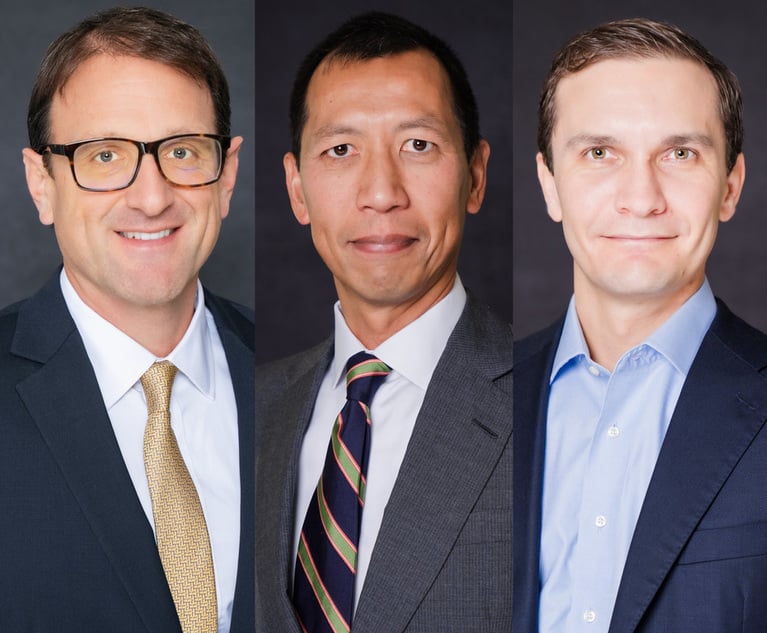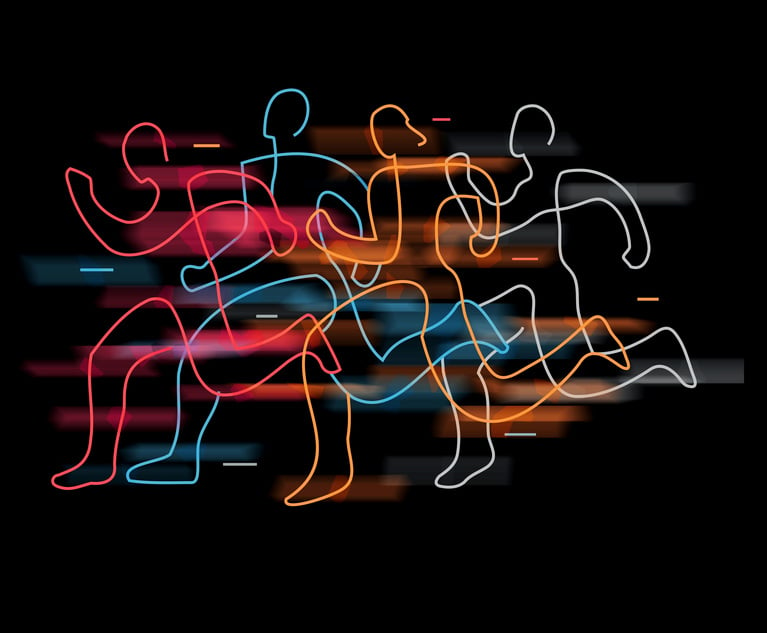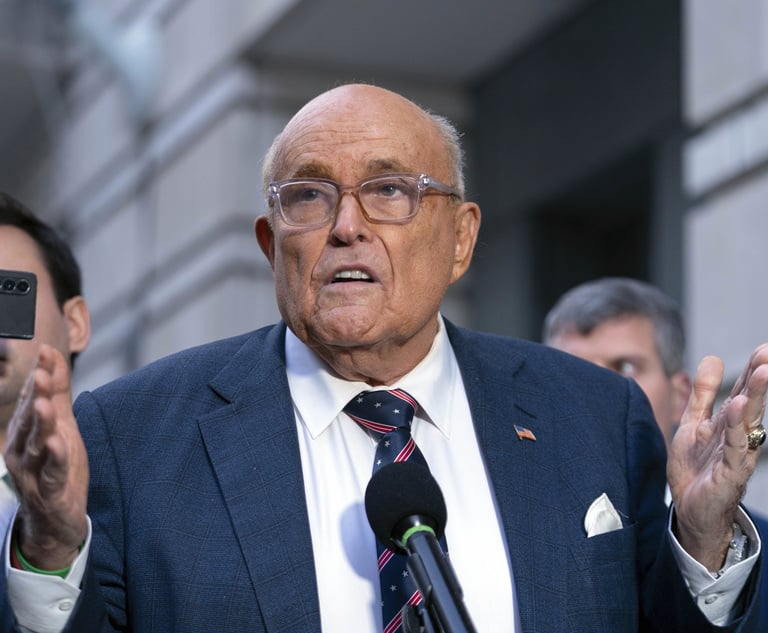Litigator of the Week Runners-Up and Shout Outs
Our first runners-up this week are Josh Koskoff, Chris Mattei and Alinor Sterling of Koskoff, Koskoff & Bieder who landed a nearly $1 billion verdict…
October 14, 2022 at 07:25 AM
4 minute read
Our first runners-up this week are Josh Koskoff, Chris Mattei and Alinor Sterling of Koskoff, Koskoff & Bieder who landed a nearly $1 billion verdict against Alex Jones, who for years claimed the 2012 Sandy Hook shooting that killed 20 first graders and six educators in Newtown, Conn., was a government hoax. A state court jury in Waterbury on Wednesday awarded a total of $965 million in defamation and slander damages, and emotional distress damages to the 15 plaintiffs—victims' family members and a first responder. We previously named Koskoff and Sterling Litigators of the Week in February after they reached a $73 million settlement with Remington over Sandy Hook families' claims that the marketing of the Bushmaster AR-15 used in the shooting violated the Connecticut Unfair Trade Practices Act.
A Kirkland & Ellis team led by Gregg LoCascio lands a runner-up spot for getting a key win for Roomba maker iRobot in a showdown at the U.S. International Trade Commission with rival Shark. After a one-week remote trial in January, Administrative Law Judge MaryJoan McNamara last week sided with iRobot finding its patents covering carpet detection and auto-docking valid and infringed by Shark. The ALJ recommended an exclusion order barring Shark from importing or selling products with the patented features in the U.S. The Kirkland team representing iRobot also included partners Paul Brinkman, Kristina Cary, Anders Fjellstedt and Sean McEldowney; and associates Steven Dirks, Peter Evangelatos, Diva Hollis, Tiffany Knapp, Karthik Ravishankar and Tera Jo Stone. (Fjellstedt has taken an in-house position at Disney since the trial and both Knapp and Ravishankar have been promoted as partners.)
Runners-up honors also go to a separate Kirkland team led by Matt Owen, Erin Cady and Megan McGlynn that represents Tenaris Coiled Tubes LLC, a maker of quench-and-tempered coiled tubing used in oil exploration, in litigation with rival Global Tubing LLC. Tenaris brought patent claims against Global and Global, in turn, brought antitrust claims alleging Tenaris obtained its patents by fraud, and is attempting to assert them to monopolize the market. Last week U.S. District Judge Keith Ellison in Houston granted Tenaris summary judgment on Global's Sherman Act claims after oral argument. The judge held it would be legal error to allow Global's antitrust claim to proceed based on evidence that a third player in the market, Quality, would continue to hold the largest market share and Global couldn't show that Tenaris intends to assert its patents against Quality.
This content has been archived. It is available through our partners, LexisNexis® and Bloomberg Law.
To view this content, please continue to their sites.
Not a Lexis Subscriber?
Subscribe Now
Not a Bloomberg Law Subscriber?
Subscribe Now
NOT FOR REPRINT
© 2025 ALM Global, LLC, All Rights Reserved. Request academic re-use from www.copyright.com. All other uses, submit a request to [email protected]. For more information visit Asset & Logo Licensing.
You Might Like
View All
Litigators of the Week: A $630M Antitrust Settlement for Automotive Software Vendors—$140M More Than Alleged Overcharges

A Second Straight Year of Increased Securities Filings—With Perhaps More on the Horizon
Law Firms Mentioned
Trending Stories
- 1AIAs: A Look At the Future of AI-Related Contracts
- 2Litigators of the Week: A $630M Antitrust Settlement for Automotive Software Vendors—$140M More Than Alleged Overcharges
- 3Litigator of the Week Runners-Up and Shout-Outs
- 4Linklaters Hires Four Partners From Patterson Belknap
- 5Law Firms Expand Scope of Immigration Expertise, Amid Blitz of Trump Orders
Who Got The Work
J. Brugh Lower of Gibbons has entered an appearance for industrial equipment supplier Devco Corporation in a pending trademark infringement lawsuit. The suit, accusing the defendant of selling knock-off Graco products, was filed Dec. 18 in New Jersey District Court by Rivkin Radler on behalf of Graco Inc. and Graco Minnesota. The case, assigned to U.S. District Judge Zahid N. Quraishi, is 3:24-cv-11294, Graco Inc. et al v. Devco Corporation.
Who Got The Work
Rebecca Maller-Stein and Kent A. Yalowitz of Arnold & Porter Kaye Scholer have entered their appearances for Hanaco Venture Capital and its executives, Lior Prosor and David Frankel, in a pending securities lawsuit. The action, filed on Dec. 24 in New York Southern District Court by Zell, Aron & Co. on behalf of Goldeneye Advisors, accuses the defendants of negligently and fraudulently managing the plaintiff's $1 million investment. The case, assigned to U.S. District Judge Vernon S. Broderick, is 1:24-cv-09918, Goldeneye Advisors, LLC v. Hanaco Venture Capital, Ltd. et al.
Who Got The Work
Attorneys from A&O Shearman has stepped in as defense counsel for Toronto-Dominion Bank and other defendants in a pending securities class action. The suit, filed Dec. 11 in New York Southern District Court by Bleichmar Fonti & Auld, accuses the defendants of concealing the bank's 'pervasive' deficiencies in regards to its compliance with the Bank Secrecy Act and the quality of its anti-money laundering controls. The case, assigned to U.S. District Judge Arun Subramanian, is 1:24-cv-09445, Gonzalez v. The Toronto-Dominion Bank et al.
Who Got The Work
Crown Castle International, a Pennsylvania company providing shared communications infrastructure, has turned to Luke D. Wolf of Gordon Rees Scully Mansukhani to fend off a pending breach-of-contract lawsuit. The court action, filed Nov. 25 in Michigan Eastern District Court by Hooper Hathaway PC on behalf of The Town Residences LLC, accuses Crown Castle of failing to transfer approximately $30,000 in utility payments from T-Mobile in breach of a roof-top lease and assignment agreement. The case, assigned to U.S. District Judge Susan K. Declercq, is 2:24-cv-13131, The Town Residences LLC v. T-Mobile US, Inc. et al.
Who Got The Work
Wilfred P. Coronato and Daniel M. Schwartz of McCarter & English have stepped in as defense counsel to Electrolux Home Products Inc. in a pending product liability lawsuit. The court action, filed Nov. 26 in New York Eastern District Court by Poulos Lopiccolo PC and Nagel Rice LLP on behalf of David Stern, alleges that the defendant's refrigerators’ drawers and shelving repeatedly break and fall apart within months after purchase. The case, assigned to U.S. District Judge Joan M. Azrack, is 2:24-cv-08204, Stern v. Electrolux Home Products, Inc.
Featured Firms
Law Offices of Gary Martin Hays & Associates, P.C.
(470) 294-1674
Law Offices of Mark E. Salomone
(857) 444-6468
Smith & Hassler
(713) 739-1250








